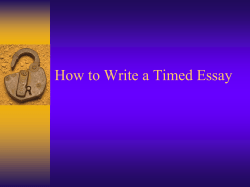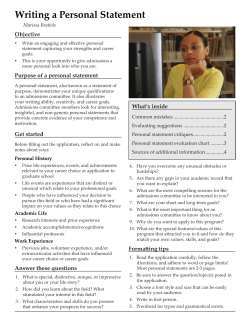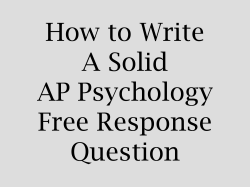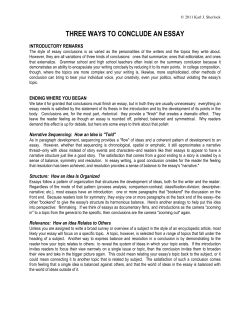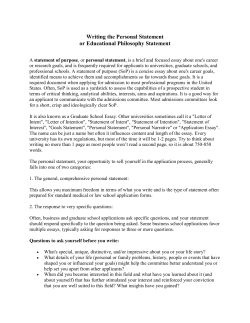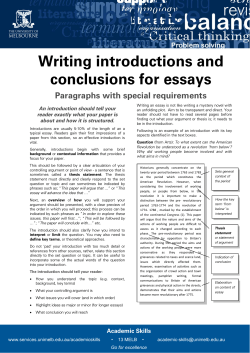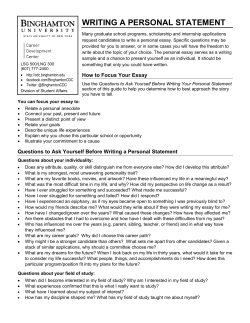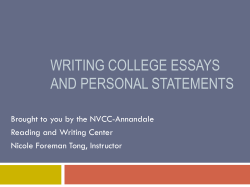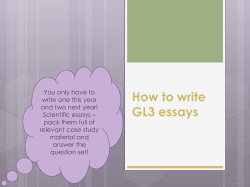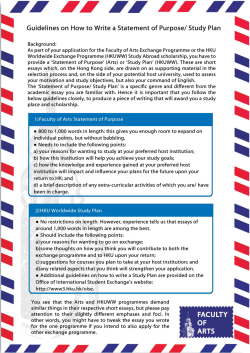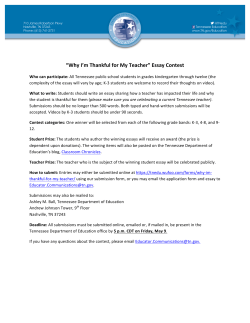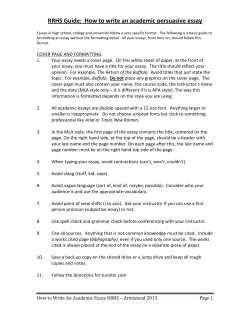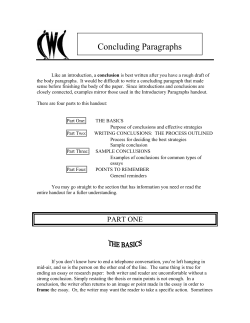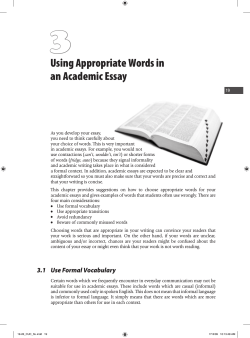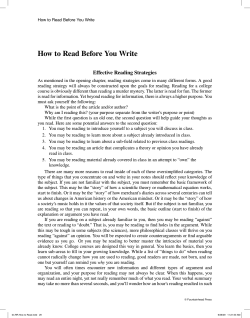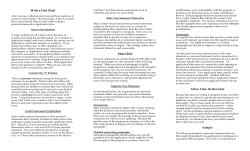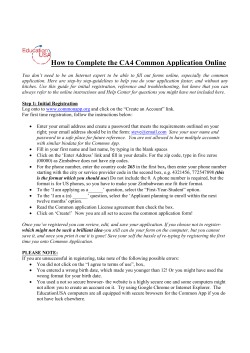
Consider Examples
Consider CONSIDER telling a story that shows the reader something about you through your writing. Writing an essay can be intimidating. “What do I write about?”, “What do they want to hear?”, “How can I tell them all about me in one essay?”, are questions that come to mind. Storytelling comes naturally and is more real than writing directly about your qualities, abilities and accomplishments. The person reading your essay probably reads hundreds of essays in a short time; stories are easier to read and have more of an impact on the reader than a standard, all-inclusive essay where you tell about yourself and your accomplishments. WRITE the lead. This is the most important part of your essay; it is the place to “grab” the reader’s attention, to make them want to read more. Writing the lead implies that you have an idea of where you will be going with the essay. You will need to start with an incident, anecdote, event, or perhaps a person, quote or scene. This will be the vehicle which will carry the reader to discover the qualities about yourself you may have identified in the previous steps. The lead need not reveal anything about you right away. Examples Lead Examples: 1. The frigid Pasco wind burned my face, chilled my bones. I wanted to be back in my living room, curling up in a quilt next to the big brick fireplace with a steamy mug of hot chocolate. 2. She is four feet six inches tall. Her wrinkled body stands wrapped in a hand-knit sweater, like a figure from classic painting. On her feet are heavy, black leather shoes with thick soles, like the ones on my white-haired grandfather in the old yellowing photographs. 3. During my first week of high school I thought I had a sign on my back that said “new kid, look at me!” At least it seemed that way from the glances that came my way. I knew no one, and at the moment had no desire to open my mouth and introduce myself. WRITE the essay. Sometimes the lead will naturally begin the flow of the essay and sometimes the essay is sketched out and then the lead reveals itself. The first draft should be one of many rewrites. Don’t get locked into “getting this thing finished”. Write when you feel it coming to you then reread, edit, rewrite until you are satisfied, THEN have it read by an adult who knows you and knows something about admissions essays. It isn’t necessary to have three or four people read it; you’ll probably get opposing suggestions. You don’t want the flavor and style of your writing to be stifled by too many suggestions. Do proofread, spell check, grammar check, usage check and any other check that will avoid a “stupid mistake”. It is important to follow all the directions in the prompt, including length, topic, format and content. “I have no idea how to start this essay about myself!” A guide to writing college entrance essays Where to Begin THE ESSAY is really the only part of the admissions process that offers you the chance to be original and creative. More universities are putting emphasis on the essay because it is the only way they get to know an applicant’s personality, wit, experiences or character. A well-written and revealing essay may be the deciding factor in your admissions. BEFORE YOU WRITE: Read some good writing. You will get an idea of what types of essays colleges are getting, and you will see the quality of writing that you are up against. There are lots of resources that have samples of college essays. Look for a resource that gives a commentary about the quality of the essay samples. The essays in these books are very good, something to strive for, but not everyone who gets into college can write as well as these superlative examples, especially if writing is not a strength. Think About Yourself THINK ABOUT YOURSELF: This may be the hardest part of the essay. Look for the qualities that, if someone really knew the real you, they could describe you perfectly. What about the way you think, act, make decisions and interact with people is important to you? This is what the admissions people need to know when they are finished reading your essay. To help you do this, make complete sentences of the following starters: 1. In my life, I have learned… 2. My greatest strength is… 3. I learned a valuable truth about myself when… 4. I take pride in… 5. I find satisfaction in… 6. Sometimes I have to… 7. I am a very______ person who thinks it is important to… 8. I believe every person… 9. I have always tried to… RESOURCES On Writing the College Application Essay, by Harry Bauld The Admissions Essay, A Help Packet, http://www.essayedge.com The College Application Essay, by Sarah Myers McGinty The College Board, www.collegeboard.com (search admissions essays) 10. …(character trait) is important to me because… 11. I think we’d all be better off if we… 12. Before I was...but after (event)...I became much more… 13. This (event) shows an important part of me... Expand EXPAND each sentence into a paragraph or related sentences. You are looking for wellcrafted sentences with exact words that can be used in your essay. They might be the building blocks that you could adapt to any topic about yourself. Examples: 1. “I have discovered that the essence of my life is to give love and support to other people and receive those things in return. I live for the interaction.” 2. “In my life, I’ve learned that humility is valuable. I’m not perfect. I shouldn’t pretend to be.” 3. “My greatest strength is that I’m not afraid to go out on a limb, to make mistakes, and to learn from them.” 4. “Sometimes, I have to swallow my pride, admit that I don’t know how to help them. And yet, these instances have the greatest impact, when we discover the answer together.” Five questions a college entrance essay reviewer may ask themselves when reviewing an essay: What did I learn about you from reading your essay? What will I remember about you from this essay? Do I have a sense of your intellectual vitality and/or how your mind works? Do I have confidence n your overall writing ability? Am I left with any nagging questions or concerns?
© Copyright 2025
